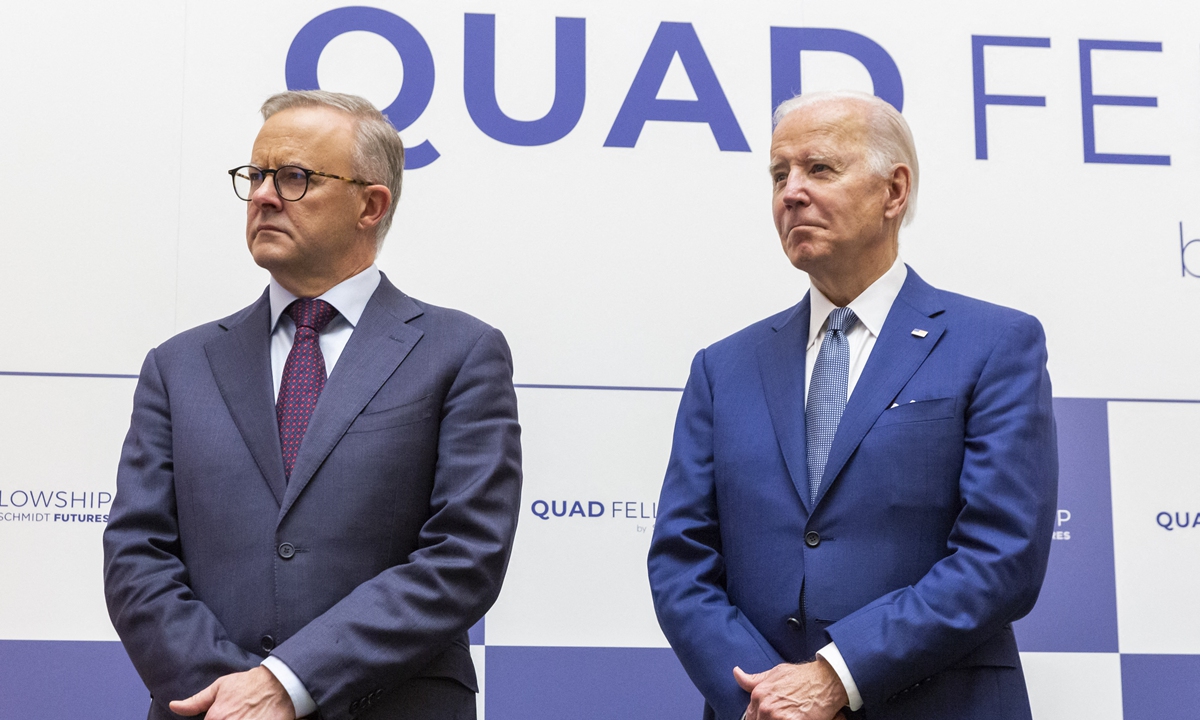
Australian Prime Minister Anthony Albanese(left) and US President Joe Biden attend the Japan-US-Australia-India Fellowship Founding Celebration event on May 24, 2022 in Tokyo, Japan. Photo: AFP
The new Australian Prime Minister Anthony Albanese met separately with US President Joe Biden on Tuesday on the sideline of the Quad summit, affirming a strong partnership and emphasizing regional security and cooperation under the AUKUS alliance. Experts who tried to find positive signals viewed Albanese's diplomatic debut as a show under his predecessor Scott Morrison's shadow because distinct foreign policy can't come overnight, especially when it comes to the political correctness of "putting the Australia-US alliance first" he has to follow.
In a Quad meeting on Tuesday, Albanese praised the other three leaders as Australia's "like-minded friends," saying that his new government will bring the new energy and resources to ensure a secure and prosperous Indo-Pacific, the Guardian reported. He said in his first official meeting as prime minister that Australia's commitment to the Quad had not changed, and will not change under his leadership.
"The new Australian government's priorities align with the Quad agenda - taking action on climate change, and building a stronger and more resilient Indo-Pacific region," he said during the meeting.
Quad is widely considered a bloc designed to form a united front against China in the so-called Indo-Pacific region, toward which Chinese officials have voiced strong opposition. Chinese State Councilor and Foreign Minister Wang Yi said on Monday that China resolutely rejects any attempt to introduce confrontation between military blocs and camps in the Asia-Pacific region.
After the meeting between Biden and Albanese, the White House issued a statement saying that the leaders praised the swift progress the US and Australia are making, together with the UK, under the AUKUS partnership. The two leaders also agreed to work closely together to implement the Indo-Pacific Economic Framework and to collaborate in addressing the existential threat posed by climate change, the statement said.
It's not surprising that the new Australian Prime Minister is repeating some old-fashioned rhetoric such as prioritizing the Australia-US alliance, as it's just the second day since he was sworn in and diplomacy is one of his shortcomings given little experience in the field, Chen Hong, president of the Chinese Association of Australian Studies and director of the Australian Studies Center at East China Normal University, told the Global Times on Tuesday.
"When it comes to diplomatic and security issues, he has yet to walk out of the shadow of his predecessor," Chen said, noting that putting the Australia-US alliance first is also political correctness in Australia that this new leader has to follow.
The new Australian leader appeared to not differ much from the anti-China tone adopted by Scott Morrison when he talked about China during the Quad meeting.
He rejected China's claims that Australia is to blame for its sanctions and stands by the island of Taiwan to provide peace and stability in the region, Albanese told a media briefing on Tuesday.
"It's not Australia that has changed. It's China. It's China that has applied sanctions on Australia. There is no justification to do that. And that's why they should be removed," he was quoted as saying in the Australian Financial Review. He also said that the Australian government's stance on the Taiwan question has not changed despite the Labor Party's victory.
Yu Lei, chief research fellow at the Research Center for Pacific Island Countries of Liaocheng University, told the Global Times on Tuesday that "Australia can't get rid of the pressure from the US. Without the support of Washington, no party can rule or govern for a long time there."
Yu noted that Australia will follow the US-led Indo-Pacific strategy in countering China in politics, diplomacy and military.
The Labor Party had criticized the Morrison administration's China policy, which sparked discussions about whether the new Australian government would bring some new hope to the Australia-China relationship that has been sliding in recent years due to Morrison's reckless anti-China moves in coordinating with Washington's geopolitical strategies. However, Chinese experts hold a cautious attitude toward potential changes of the Albanese administration in formulating its China policy.
As a freshman in diplomacy, it's impossible for Albanese to come up with a distinct foreign policy overnight, so he has to repeat the past rhetoric. But he criticized the Morrison administration for antagonizing China, which was Australia's largest trading partner during the campaign, which sent out a positive signal, Chen noted.
At the beginning of the Quad meeting, Biden also made a joke of this freshman in such an important diplomatic meeting, saying that he'd understand if the newly elected Australian prime minister dozed off during the session as he was busy at the election and flew to Tokyo the other day.
"Although it's a joke, it could tell that Australia is at an insignificant position in this mechanism," Chen said.




